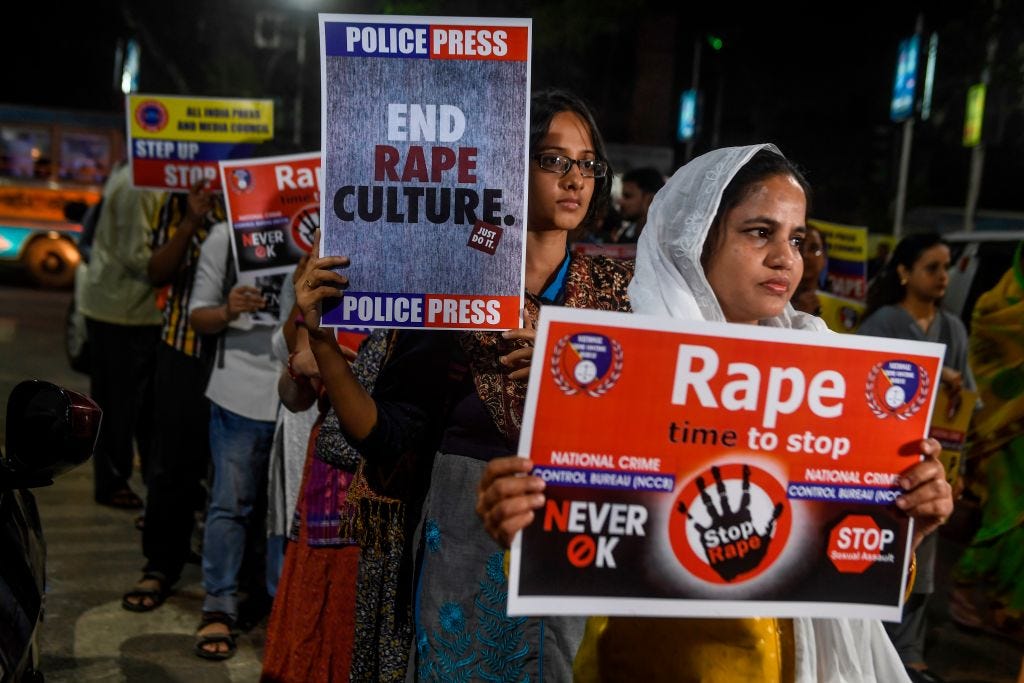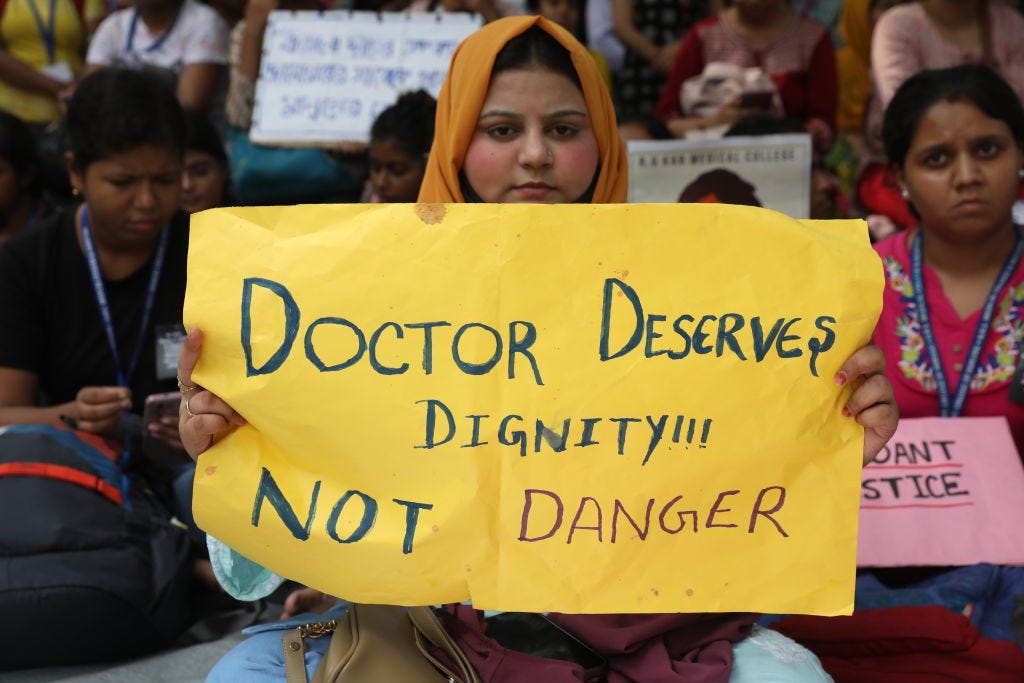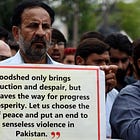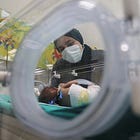"No Places for Women": What Will It Take to End Rape Culture in India?
The rape and murder of a trainee doctor in Kolkata has shocked the country. But will it spur real change?

Early last month, a 31-year-old trainee doctor at Kolkata’s RG Kar Medical College was midway through a 36-hour shift when she took a break to eat a late dinner with her colleagues around 2 am local time. After the meal, they left her alone in the seminar room, where she was reportedly going to rest because there were no facilities for exhausted doctors. The next morning, her body was found with signs of extreme sexual abuse. Hospital administrators told her family that she had committed suicide, but when her parents – who had toiled and saved to send their only child to medical school – saw the body, it was beyond evident that she had been tortured and murdered. Her father, a tailor, had worried about her safety traveling home late at night after her shifts and had borrowed money to buy a car. “I wanted her to be safe on the roads at night,” her father said, “but she wasn’t even safe at the hospital as a doctor on duty.”
After the story broke and a hospital volunteer was arrested, protests erupted in Kolkata and across India. The principal of the medical college didn’t, at least publicly, offer his deepest condolences or promise an inquiry. Instead, Sandip Ghosh asked why the female doctor was resting alone in a room at night. The India Medical Association, the country’s largest group of doctors, called a nationwide strike shutting down all non-emergency services for 24 hours across the enormous country. Women across India joined the protests to express their anger and grief. Junior doctors in Bengal kept their strike going for weeks, ending it only recently.
This is not the first time that India has been rocked by such a barbarous crime. A young woman was horrifically gang raped on a bus in Delhi in 2012, sending shock waves across the world. In 2018, an 8-year-old Muslim girl, Asifa Bano, was gang-raped, held for days in a temple, and then killed. When her alleged rapists were arrested, two ministers from the ruling BJP party attended rallies in support of the men. Though they later had to resign, it was that same year that a Thomson Reuters Foundation’s annual report called India the most dangerous country in the world for women, surpassing Saudi Arabia and Afghanistan. Four years later, in 2022, it was estimated that an average of 86 rapes took place in India every day.
A Deadly Combination
Why India, then?
Indian men don’t hate women any more than English men or French men do, as shown by the recent, grotesque cases of Wayne Couzens, a former London police officer serving a life sentence for rape and murder, or Dominique Pelicot, who admitted to drugging his wife and recruiting dozens of men to rape and sexually assault her. Pelicot explained his sadistic abuse against his wife by saying that he was “utterly idle” after retiring.
Gender inequality, violent patriarchy, misogyny, and accepted, casual violence to women are universal. India has all those factors, as every country does, but its rapid and ruthless neo-liberalization in the 1990s wrought havoc on its society and men in ways that are increasingly evident in the rage and cruelty of these rape cases.

Speaking of the youngest Delhi rapist, Indian sociologist Ashis Nandy noted that it was he – the minor – who inflicted the most horrific violence on the woman, named Nirbhaya, or brave heart, by the Indian press. According to Nandy, the boy had left home at 8 years old to work in highway eateries. He was brutalised himself, Nandy noted: the roadside stalls are notorious for the sexual abuse of children, beyond which he had been separated from his family. That dislocation, alienation, and rage is a deadly combination.
The details of the crime in Kolkata are so grisly: the injuries the woman sustained, the way her body was found, the fact that after her death, her name was released in contravention of Indian law, which was then entered into Google video searches and porn sites by so many people that her name “+ photo + video” reportedly became the fifth most searched item in India according to Google Trends. Though grotesque, this is perhaps not surprising, given that across regional languages as well as Bollywood cinema, violence towards women is presented casually and constantly. It is as much a standard of local cinema as the song and numbers – it is entertainment.
No Places for Women
At nearly the same time as the Kolkata crime, a Dalit woman was gang-raped in Lucknow, but her violation did not inspire national protests. The rapes of Dalit and tribal women rarely do, though they are not any less horrific. Dalit women, who comprise around 16% of India’s female population (80 million), exist at the bottom of a brutal caste hierarchy. According to Human Rights Watch, they make up the majority of India’s landless laborers and scavengers and are so vulnerable to both physical and sexual violence that a law had to be passed by the Indian parliament in 1989 to prevent atrocities against them. But the laws make little difference to Dalits, faced with police apathy and outright hostility, little political power, and the fact that casteist attitudes prevail in Indian society.
After the Kolkata rape, the self-proclaimed “concerned citizens” of an apartment complex in a well-to-do Mumbai neighborhood organized a “reclaim the night” protest in the public space outside a shopping mall and asked women to come out and join them in large numbers. But when the Bahujan women (a term that includes members of scheduled castes, including Dalits, as well as scheduled tribes) of the nearby Jai Bhim Nagar slum joined the protests, they were asked to leave. Their homes had recently been demolished, just ahead of monsoon season, leaving this population of vulnerable women in further precarity – they were sleeping out on the footpaths, in the open, under the angry elements. They had come to demand safety and to show solidarity with the trainee doctor whose story had shaken them. “Your issues are different from those raised here,” one of the apartment complex women reportedly told the Bahujan women. “This is an exclusive protest.”
But these are no places for women, period – not for tribal women, not for Dalits, not for married women since India’s new penal code does not criminalize marital rape, not for Kashmiri women who have suffered rape as a weapon of war at the hands of Indian soldiers who are protected under the Armed Forces Special Powers act. In 1991, soldiers raped more than 30 women in the villages of Kunan and Poshpora. Not one of the women has received justice over three decades later. The same wrestler who represented India at the Olympics, Vinesh Phoghat, left her two national medals on the roadside in December after Delhi police prevented her from meeting Prime Minister Narendra Modi after she and 10 other wrestlers accused Brij Bhushan Singh, the former Wrestling Federation of India Chief of sexual harassment. Singh is a member of the BJP. Earlier that year, Phoghat and others were roughed up by the Delhi police when they protested in the capital.
“War Has Become Essential”
This frightening animus towards women is shared by men – both powerful and powerless – but finds strange allies among women too. Two years ago, a website popped up selling prominent Muslim women for nominal amounts to work as servants. The Muslims being sold on the fake online auction were well-known journalists, activists, and public figures. It was not the first time such a site had appeared, but this time the police went to arrest the culprit who had put the site together. It was a woman. The bizarre trend of Hindutva pop songs calling for the death and expulsion of Muslims from India is fronted by plenty of women singers.
India’s Central Bureau of Investigation has stepped in to probe the Kolkata case, and though its investigations are ongoing, it has said there may not be evidence of gang rape. Many questions remain. South Asia, like much of the world, is held in the grip of a sinister and insidious force: a neoliberal, capitalist mindset that has ravaged society and shattered so many lives in its wake. “We are living in a very violent economic order to which war has become essential,” Indian activist and author Vandana Shiva has said, "war against the earth, war against women’s bodies, war against local economies, and war against democracy. And I think we need to see the connections between all these forms of violence."

Globalization and its failures can be seen in this split screen – the India of the uber-rich Ambanis, where $600 million dollars can be spent on a single human being’s wedding, and a family of five people can live in a 27-story skyscraper, known as Antilla, that cost $2 billion to build and the India where the monthly minimum wage is 5,340 rupees or $63. It is these two Indias that have dislocated hundreds of millions of rural men to bring them to metropolises to build mansions and malls for the ultra-wealthy. Life in ancestral villages, however hard, were places that had inbuilt systems of support and networks that relied on each other for generations, and these lives were uprooted to faceless megacities where each man must survive on his own and encounter countless deprivations in order to eke out a meager living. Besides the physical disjointedness of such a massive upheaval, there is the humiliation, the isolation, and with it, naturally the rage. The young men responsible for the 2012 Delhi rape that horrified the world were the picture images of this dislocation and rage.
These failures of globalization and capitalism are built into the systems that thus far have no way of managing this violent inequality. Rather, they depend on it. There is a global epidemic of violence towards women – the perpetrators must be punished, the police and legal institutions must answer why so few safeties exist to protect women yet so many to exonerate their tormentors, but there must also be a societal reckoning if this war on women is to be ended. You cannot have Antilla without the degradation of the man who lays its bricks. And without any redress of this shock doctrine, it is hard to imagine how women anywhere, from doctors in Kolkata to Dalits in Lucknow, will be safe.
Missed previous editions of Fatima Bhutto’s ‘The Global South’? Check out some of them below…






Men rape and abuse women. Other men know about it, remain silent and look the other way. Women have always been seen as a "prize" or "reward" for soldiers. This has been going on forever. Many women are viewed as property and as second-class citizens which allows this to continue. Having rage may be an explanation but it isn't an excuse. Men with this type of rage don't go out looking for a dog to kick; they look for a woman to hurt. Rape is about control and power. Until men change their views of women and rape culture it will be difficult to change this. In the US, most women do not report rapes to the police because they know that they'll be suspected of lying, they can be sued by the rapist for slander, if alcohol and/or drugs are involved they'll be blamed, they will experience shame and guilt. Many police departments have years of untested rape kits. And now, in many states, if rape results in a pregnancy women will be prevented from having an abortion. This is about controlling women.
White-supremacist countries — very much like India with its caste system — don't want rape to be taken seriously.
There's nothing accidental about a social hierarchy.
They don't want men growing a spine, and finding the guts to fight POWER; they want men slithering around in the shadows, wallowing in shame, and punching DOWN.